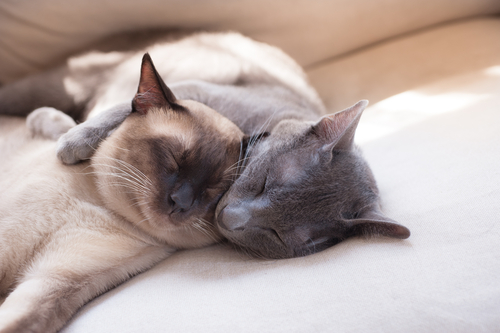There are tell-tale signs that your multiple cats will exhibit that let you know if they consider themselves friends or enemies.
Of course, it may be obvious to you that two of your cats are getting along. They play nicely, may groom each other and often will sleep touching each other or at least in close proximity. There are some other behaviors that cats use with each other when they feel comfortable, I spoke about these on the podcast episode, number 72 and here are the lists I promised you.
From the book, “Cat Sense,” by John Bradshaw, here are the signs that cats do or do not get along with each other.
Cats that get along, and tend to feel that they are part of a same social group, will:
Raise and hold their tails straight up when they see each other.
Rub against each other, when walking along or passing by.
Play gentle, “fake fighting” games together and will share their toys.
Cats that have set up separate territories in the house and don’t really get along will:
Chase or run away from one another and avoid contact. You may notice that one cat consistently leaves the room when one enters.
Watch each other intently and may hiss or spit when they meet.

Look unusually tense, if they are in the same room.
Interact separately with you. They may sit on opposite sides of you to avoid any physical contact with each other.
When sleeping, they stay far apart in widely separated spots. One of the cats may sleep somewhere high up, like on the cat tree to purposely avoid the other one and they may sleep defensively, with their posture looking tense and ears twitching.
Purposely, restrict the movements of the other cat, by, for example, sitting for hours at the top of the stairs so that the other cat does not dare to go there.
If you have multiple cats in your home, are they friends or do they avoid each other or get into fights often? What other behaviors have you seen? Let’s start a discussion. Please, leave your comments.




Hi Susan,
I never knew that cats spit. I’ve seen cats hiss before, but never spit. Cats are fascinating creatures! I’m definitely more of a dog lover, but I appreciate the kitties too. 🙂
Glad you’re enjoying finding out about cats as well. My cat Willie used to do some combo of a hisspit. New word?
We only have one cat. He seems to not like us at all. He bites us quite often and never sits in our laps and will not sleep with us. He will occasionally come on the bed and nuzzle but before long he gets down and leaves the room. Should I be concerned? We love him so much, but feel like he doesn’t return love to us.
Hi Aileen, I know you want a loving and affectionate relationship with your cat. It’s disheartening when a cat is aloof…..getting bitten, is another issue. It can be scary, painful and something you’ll want to get to the bottom of and figure out what is causing it. I am going to e-mail you separately to find out more about your cat to help you know what to do. I want to know for example, how old is your cat, when did you get it, when and how does it bite, etc. If the bites are not in play or from ambushing your ankles, there are a number of reasons an adult cat may bite (I’m assuming you don’t have a kitten.) Some are, it was never taught as a kitten that biting humans is unacceptable, there may be an underlying medical cause to rule out, there are cats that bite when being petted (called petting induced aggression.) Perhaps your cat is fearful and this can cause them to become aggressive. I want to find out what the circumstances are with your cat. I know it seems like your cat does not like you and so it stays away. This can possibly change in time and about the biting – cats do not bite because they are “mean.” It is usually because they feel they have no other choice but to defend themselves. Let’s see what you can do to make this better.
I have two sister cats. They are very different. My non-alpha is still standoffish after 12 years. Some cats are just that way. It doesn’t mean they don’t love you; it’s just their personality. Please be patient and he/she may come around. As with people, they grow and change as they age. Thank you for giving a home to one of God’s creatures.
Thanks Debbie, good insight. Yes, the cat may be doing the best it can to show love.
Just got a new kitten and my Siamese male has accepted her (plays with her, cleans her, etc.) yet his sister hasn’t and he and his own twin sister do not get along. Why would litter mates not get along?
Hi Holly, It does seem that litter mates would get along, and it is true that litter mates that are homed together usually form a stronger bond and get along better than two unrelated cats, but this is not always the case. Sibling rivalry does happens with cats just like with people. Think all the brothers and sisters in families that don’t get along with each other – especially when they are growing up in the same house. There are a number of possible reasons that cats won’t get along. Besides the things I spoke about in the podcast, Episode 72 and the blog, there can be personality conflicts, issues that arise from the early socialization of each other when they were very young kittens with mom, but the two most common reasons for cats not getting along, has to do with how the house environment is set up and our missing subtle signs of conflict between cats. Remember, a cat’s territory in the home is extremely important to them, and social interactions will go more smoothly when no cat feels they have to compete for food, safe places to eliminate and nap or for the attention of you or other people in the home. Without realizing it, we set up situations where the cats do have to compete for the resources and then it results in tension and conflict. I really like what Pam Johnson-Bennett says about what to do to make sure the house is set up right in her book, CatWise. The book is a question and answer format. See the questions about when cats don’t get along. Page 174 – 180.
I hv 5 cats 2 r bengals, they all got along pretty well until one of my bengals got a UTI & got a needle of antibiotics. She had slept in my arms since she was 3 months old. All of a sudden I think she became submissive & no matter what she will not come on my bed any longer! It breaks my heart. She will only lay w 1 of the other cats but only if he is not on my bed. She always used to play & lay with her sister who is also a bengal but never now she will only hiss & fight w her. I don’t know what to do to get her to lay in my bed anymore.
Hi Gina, I hear how upsetting and saddening this is for you. It would be for me as well. So initially what comes to my mind is what can happen after one cat comes back from being at the Vet, smelling differently to the other cats. The returning cat, smells like the clinic and if they have been given medicine, this also makes them smell different. This can upset the other cats causing them to be aggressive towards the returning patient. As crazy as this sounds, for cat’s there is something called, non-recognition aggression. If one kitty comes home not smelling like they used to, the other cats seem to not know who they are and can attack. I talk about this in the podcast episode number 50. Its the segment “Why Cats Returning From the Vet Get Attacked By The Cats At Home”. Here is the link to that show so you can hear it. https://apple.co/2XzI97O. If this is the case with your cats, it sounds like whatever tension started between them, has not subsided. There are some techniques to use to “reintroduce” cats to each other that used to get along, but don’t any longer. I’m going to do a little looking through my resources so I can suggest where you can best find them. I’ll write you again.
Hi Gina,
I want to suggest a resource for you. It’s the book, CatWise, by Pam Johnson-Bennett, a certified cat behavior consultant. She has been on the podcast a few times. See chapter 13 in the book, How to deal with feline aggression. This is where I got the information about what can happen when cats return from vets and she writes about how to reintroduce cats to each other, if they have fought. She also does phone consultations for a fee. You might want to check out her website. http://www.catbehaviorassociates.com.
I have Ed three cats; two were raised together , same age. The third became part of the family later on, and isn’t always accepted by the two who were raised together. But, recently, she is being accepted by the other two…shared napping on same rug, grooming ea other, hanging out on back porch together … occasionally, one will hiss at her … not yet totally accepted by the first two cats!
Hi Leslie, Glad to hear that the new cat is starting to be accepted by some of the other cats in the home. They are probably starting to see her as being part of their social group which is good. As to the other first two cats, yep, it may take more time for them to let her into the clique or they may simply tolerate each other – which is okay. As long as they are not at each others throats. 🙂 You must be doing some good things in the house regarding their resources, (food, litter boxes,your attention) so that the cats don’t feel they have to compete with each other.
I got my two rescues at the same time, over 5 years ago. One was about 6 months old and the other was at least 8 years old. The older cat is dominant and rules the house. They “tolerate” each other. I find it strange that they sometimes greet each other by sniffing each other’s faces. It looks friendly, but never lasts long and the younger one gets back on her guard very quickly.
Hi Rhonda, It’s good that the cats tolerate each other rather than fighting all the time, which can be common in households with multiple cats. 🙂 Your older cat may be communicating some hostility to your younger one which keeps her on her guard. Keep watch to see that she can get to her litter box and food and napping places safely without fear of being ambushed by the older one.